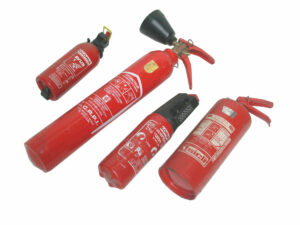Extinguishers
Through preventive measures, fires in the house or vehicle can be excluded as far as possible, but not completely prevented. Since different chemical processes take place in each fire depending on the fuel, different extinguishing agents are required.
What are the types ?
Water and foam extinguishers contain water as extinguishing agent, which is provided with various chemical additives in order to be able to fight a fire efficiently with as little water as possible.
Powder extinguishers contain a powdery salt mixture. The suitable powder can be used to extinguish fires of solids, liquids, gases and also light metals.
Gas extinguishers contain a chemically stable, inert and non-flammable gas that is also heavier than air (e.g. CO2). They have the advantage that extinguishing does not cause any additional damage (water, dust, etc.) is caused by extinguishing. The gas extinguishers also include the halon extinguishers, which have been banned since 1994. Halons are chemically related to the CFCs in refrigerators and damage the ozone layer.
How does a fire extinguisher work ?
Fire extinguishers contain extinguishing agents in pressure-resistant metal cylinders. It is released by a propellant gas (usually CO2 or nitrogen) in powder and liquid extinguishers. By removing the sealed locking pin and activating the propellant gas cartridge (not necessary for permanent pressure extinguishers), the extinguishing agent can be applied to the source of the fire. It withdraws the energy from the fire and/or displaces the oxygen, so that the fire goes out.
Where to put old fire extinguishers ?
Old fire extinguishers from households can be handed in at all SuperDrecksKëscht® fir Bierger collection points.
What happens then ?
Halon extinguishers are rendered harmless in special high-temperature plants.
Powder extinguishers go to the partner LRD, where the disassembly takes place.
Hint:
- Never use the environmentally harmful halon extinguishers again!
- Do not expose fire extinguishers to direct sunlight, keep valves closed !
- Have your fire extinguishers serviced regularly. Unattended equipment can explode due to corrosion damage if pressurized during use.
- Never use water to extinguish burning fats, danger of a fat explosion !
- Gas extinguishers can get very cold when used, danger of frostbite !
Product receiver:
LRD Löschmittelrecycling, D-Harsefeld
www.lrd-umweltdienste.de

Extinguishers
Through preventive measures, fires in the house or vehicle can be excluded as far as possible, but not completely prevented. Since different chemical processes take place in each fire depending on the fuel, different extinguishing agents are required.
What are the types ?
Water and foam extinguishers contain water as extinguishing agent, which is provided with various chemical additives in order to be able to fight a fire efficiently with as little water as possible.
Powder extinguishers contain a powdery salt mixture. The suitable powder can be used to extinguish fires of solids, liquids, gases and also light metals.
Gas extinguishers contain a chemically stable, inert and non-flammable gas that is also heavier than air (e.g. CO2). They have the advantage that extinguishing does not cause any additional damage (water, dust, etc.) is caused by extinguishing. The gas extinguishers also include the halon extinguishers, which have been banned since 1994. Halons are chemically related to the CFCs in refrigerators and damage the ozone layer.
How does a fire extinguisher work ?
Fire extinguishers contain extinguishing agents in pressure-resistant metal cylinders. It is released by a propellant gas (usually CO2 or nitrogen) in powder and liquid extinguishers. By removing the sealed locking pin and activating the propellant gas cartridge (not necessary for permanent pressure extinguishers), the extinguishing agent can be applied to the source of the fire. It withdraws the energy from the fire and/or displaces the oxygen, so that the fire goes out.
Where to put old fire extinguishers ?
Old fire extinguishers from households can be handed in at all SuperDrecksKëscht® fir Bierger collection points.
What happens then ?
Halon extinguishers are rendered harmless in special high-temperature plants.
Powder extinguishers go to the partner LRD, where the disassembly takes place.
Hint:
- Never use the environmentally harmful halon extinguishers again!
- Do not expose fire extinguishers to direct sunlight, keep valves closed !
- Have your fire extinguishers serviced regularly. Unattended equipment can explode due to corrosion damage if pressurized during use.
- Never use water to extinguish burning fats, danger of a fat explosion !
- Gas extinguishers can get very cold when used, danger of frostbite !
Product receiver:
LRD Löschmittelrecycling, D-Harsefeld
www.lrd-umweltdienste.de







